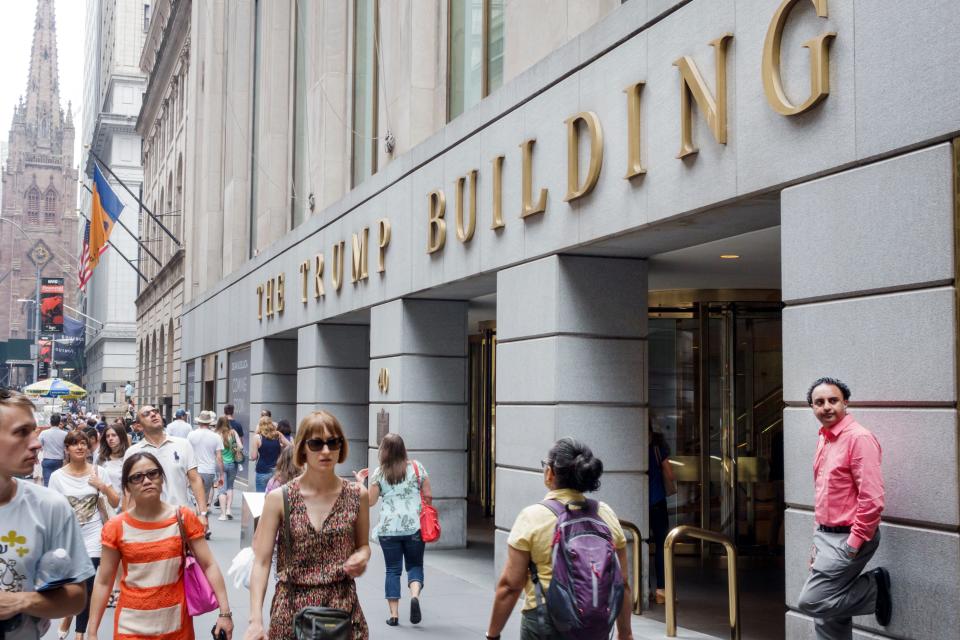It's civil 'judgment' day for Trump, but don't expect padlocks and a sheriff's sale just yet
AG Letitia James plans to go after Trump's cash and property if he doesn't pay his civil-fraud debt.
Trump's bank accounts could be garnished and his properties sold at a sheriff's auction.
One of New York's top judgment-enforcement attorneys explains how that process could play out.
Don't expect to see a gold-plated toilet dragged to the curb outside Trump Tower. Nor will there be padlocks summarily clapped on the glass revolving doors of 40 Wall Street or Trump Plaza.
Donald Trump's March 25 deadline for showing New York Attorney General Letitia James the money — the now $457 million civil-fraud judgment he owes New York — will likely come and go without much tumult.
But if Trump doesn't come up with the cash or bond, or if a judge doesn't grant him an appellate stay, James has said she's prepared to begin "enforcement," a process that could include seizing Trump's assets and a sheriff's sale of some of his New York properties.
While a plan to take Trump's social-media platform, Truth Social, public in six months could net the former president up to $3 billion, it may come too late to ward off the auctioneers.
Bernard D'Orazio, a veteran Manhattan judgment-enforcement attorney one sheriff's department insider called "the best collection lawyer in New York," gave Business Insider a step-by-step guide to what might happen next.
Trump doesn't have to do a thing
Trump is not legally bound to do anything on March 25, said D'Orazio, the principal attorney at Bernard D'Orazio and Associates.
"He's fully within his legal rights to do nothing, and if he fails to pay, he cannot be put in jail," D'Orazio said.
"We don't jail debtors anymore. We only jail them, in rare cases, if they don't comply with court orders and are found in contempt of court," he said.
"But the burden to do anything falls squarely on the winner — meaning the judgment creditor — which is what we call whoever won the lawsuit," he added. "It's their burden to seek enforcement of the judgment."
So it's all up to Letitia James?
It's up to the attorney general to start enforcement, but she will have help from New York's Civil Practice Law and Rules and the sheriff's offices in New York City and Westchester County, where Trump owns several properties.
"The burden is on Letitia James to find Trump's assets," D'Orazio said, and decide what she wants garnished or auctioned.
That's the easy part.
After five years of investigating and suing Trump — and receiving regular updates from a court-ordered fraud monitor who's been watching the Trump Organization's finances for the past 16 months — James likely knows how much the presumptive GOP presidential nominee is worth and where his assets are located.
But regardless of whether she decides to target Trump's cash, his real estate, or both, the county's sheriff's office would be responsible for garnishing Trump's bank balances and auctioning his real estate, D'Orazio said.

"It is old-school," D'Orazio said. "But we're not talking about old-timey Western-movie sheriffs with cowboy hats and stars on their chests."
"Our legal system comes out of the British system, where ultimately, the enforcement of a civil judgment comes down to the sheriff," he said.
So what happens first?
D'Orazio predicts James would first target the cash that Trump and his organization keep in New York-registered bank accounts.
"There may be a quick path forward in seeking to freeze his liquid assets," he said.
"That can be done by the attorney general sending a letter to the banks where his accounts are located. That doesn't put the money in your hand yet," he added. "It's just the first step in the process."
D'Orazio said that once the banks confirm with James that Trump's funds are frozen, she can order the New York City's sheriff's office to "garnish," or take, that money.
"The sheriff sends a legal document called a 'levy' to the banks, demanding that the bank deliver the money to the sheriff," he said.
"The sheriff then takes the money and takes his fee. The sheriff by law is entitled to 5%," he said, money that would go back to the city.
"It's called a 'poundage fee,'" he said.
For example, if the sheriff collects $100 million cash from Trump's bank accounts, he would then remit $95 million to the attorney general's office, which would go toward paying Trump's judgment.
D'Orazio said the other $5 million would go into the city coffers.
But when's the auction?
D'Orazio said James probably wouldn't drain Trump's corporate bank accounts entirely.
"How's he going to meet payroll?" he said. "I don't think the attorney general wants to put all the building porters and doormen out of work or close all these businesses."
Instead, she might go after some of his real-estate assets to reach her grand judgment total.
James could start by choosing which assets she'd want to be sold. She told ABC last month that she already has her eye on 40 Wall Street, aka "The Trump Building." Trump owns a ground lease to that building — valued at about $80 million by Forbes in September — which James can see from the windows of her financial district office one block north.
James could also target physical properties, like 40 Wall Street, or Trump's penthouse apartment in Trump Tower.
Or she could go after intangible assets, such as his 30% stake in the 1290 Avenue of the Americas building, a skyscraper one block north of Radio City Music Hall. Forbes estimated the net worth of this stake in that building is $287 million.
See the Trump properties James could target here.
After James decides on properties, the sheriff's office could serve Trump with notice that it will begin selling his assets.
"This is the ancient process of an execution of sale: a live auction where third parties would attend and bid on the property to be sold," D'Orazio said.
Again, the sheriff's office would collect a 5% fee on any auction sale.
All told, the fee on the sales to cover a $500 million judgment could top $25 million — a boon to city coffers that would come straight out of Trump's wallet.
Could they sell his Manhattan penthouse?
Trump's triplex Manhattan penthouse atop Trump Tower, his flagship Fifth Avenue skyscraper, would be fair game, said D'Orazio.
Forbes estimated in Septemeber that the penthouse was worth $52 million.
"That unit is owned by Trump personally and is not mortgaged and is not his primary residence," which makes it a likely target, D'Orazio said.
"If it were his primary residence, the attorney general would need to get a court order in order to sell it," he said.
"But it's a secondary residence, so the attorney general could try to go after that asset pretty quickly," he added. "But 'pretty quickly' means 'many months.'"
Many months? Like, almost Election Day?
A lot has to happen before an actual sheriff's sale, and it's likely that Trump would try to throw legal monkey wrenches throughout the process.
"The debtor can slow things down," D'Orazio said.
Trump is already appealing the judgment to a Manhattan appellate court: He's asking the court to either reduce the judgment or stay — meaning delay — its enforcement while the appeal progresses.
But there are other delays Trump can attempt.
"There's a safety-valve feature in judgment-enforcement law," D'Orazio said.
"You can petition the judge for what's known as a protective order, designed to prevent unnecessary harassment or abuse by the judgment creditor," he added.
New York Supreme Court Justice Arthur Engoron, the judge in Trump's civil-fraud case, would likely reject a protective order, but that rejection, too, can be appealed by Trump.
"The appellate court doesn't hear appeals during the summer," D'Orazio said. "So unless Trump somehow gets on the June calendar, which may be impossible, the next time the appellate court could hear the case would be September."

An auction also takes time
Even without these litigation delays, D'Orazio said it still takes three or four months to schedule, advertise, and then hold an auction.
He added that the sheriff's office needs to publish a notice of the auction in a public newspaper four times before it can be held.
Auctions are only held once a month in each of New York City's five boroughs. James can seek to auction multiple properties at a single auction.
Trump's Manhattan properties would be auctioned in Manhattan. Anyone could attend, but the logistics could be tricky given that there would be huge media and public interest in it.
If such a sale happens, Trump would get to keep any proceeds that rise above what's needed to satisfy the judgment.
But, as Trump has complained about before, the forced sale of his properties could be at "fire-sale prices," whether a sheriff does it or he sells them himself to pay for an appeal bond.
"I would be forced to mortgage or sell Great Assets, perhaps at Fire Sale prices, and if and when I win the Appeal, they would be gone," Trump said in a Truth Social post this week. "Does that make sense?"
Read the original article on Business Insider


